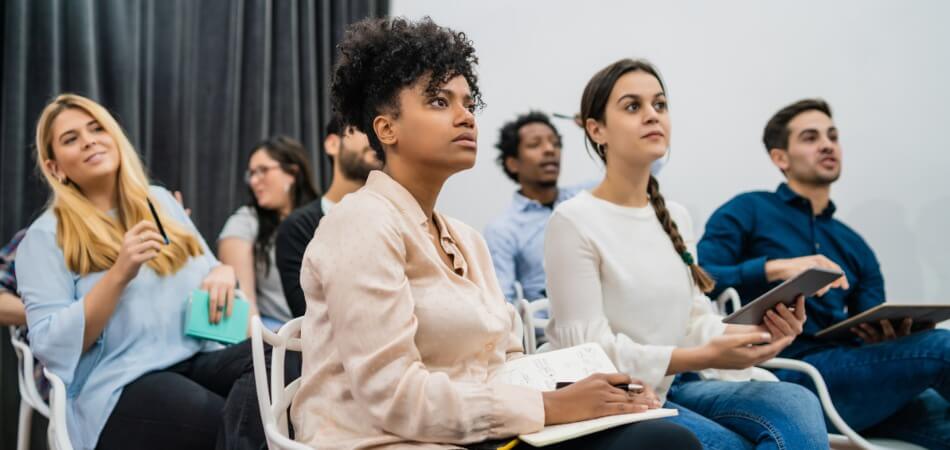A conference provides many benefits for students, making it an important component of their education. These gatherings offer many benefits beyond the confines of the classroom, making them an indispensable experience for students.
The benefits of attending conferences for students are many and include valuable feedback on research, networking opportunities within the academic community, staying updated on research trends, refining presentation and communication skills, and the chance to explore new places.
Moreover, meeting academic heroes and participating in high-level debates inspire and contribute to intellectual growth. We will dig deeper into these invaluable advantages conferences provide to students, shedding light on why participation in such events is a valuable experience.
Conferencing: What is Its Purpose?
Across diverse fields, conferences foster collaboration and innovation through knowledge exchange. They facilitate the dissemination of innovative research and insights, allowing experts to share their findings and perspectives with peers.
Also, conferences promote international communication and cooperation between academia, industry, and government by providing networking opportunities between these groups. These gatherings play a crucial role in advancing professional development.
Participants can improve their presentation and communication skills by sharing their work and participating in discussions. Furthermore, conferences provide an opportunity for researchers to receive positive feedback, contributing to the quality of academic work overall. This aspect highlights the benefits of conferences for students, who can apply these improved skills in both academic and professional settings.
Overall, the primary purpose of a conference is to create a dynamic environment where the exchange of ideas, knowledge, and experiences can grow, ultimately driving progress and innovation in various fields.
Benefits of Attending Conferences for Students
Taking part in academic conferences is an experience that can be truly rewarding for students. These events facilitate knowledge exchange and promote professional growth and development. Below are just some of the benefits students can experience through attending academic conferences:
Feedback on an early version of your latest work
Students can benefit a lot from such conferences by presenting preliminary findings and receiving positive criticism. Colleagues and experts provide insights, often revealing overlooked facets. This invaluable feedback helps refine methodologies and enhance the robustness of the research.
Get to know other people in your field
During conferences, students have the opportunity to interact with peers, mentors, and experts, which provides a broad range of perspectives and possible collaborations. By forming connections with peers, mentors, and researchers, students can develop collaborative projects, research partnerships, and sometimes even lifelong friendships.
Hear about the latest research
Conferences showcase the latest research and innovative methods. Listening to these presentations provides insights into current trends and upcoming ideas. Students can adapt and incorporate these learnings, ensuring their work remains relevant and updated.
Improve your presentation and communication skills
Getting your research in front of an audience is both challenging and rewarding. It demands clarity, precision, and adaptability. Through this exercise, students refine their oratory skills, enhance their ability to engage listeners and learn to handle on-the-spot queries confidently. The importance of conferences for grad students is clearly seen as they develop these essential skills for future success.
Visit a new place and have fun
A conference provides an escape from routine in addition to academic pressure. They’re often hosted in exciting cities or renowned institutions. This allows students to blend relaxed exploration with scholarly pursuits, offering a well-rounded experience.
Meet your academic heroes
Conferences bridge the gap between eminent scholars and budding researchers. Meeting influential figures face-to-face can be a source of inspiration. These interactions provide mentorship opportunities, guidance, and motivation to persevere in one’s academic journey.
Engage in high-level debates and refine your ideas
Conferences provide a platform for in-depth analysis and argument. Engaging in these discussions challenges assumptions, ideas, and biases. Such interactions force students to analyze their viewpoints, ultimately leading to a more detailed understanding and refined perspectives.
Adding to your CV
A student’s CV is shaped by their academic achievements. Presenting at a conference signals dedication, proactiveness, and a commitment to scholarly discourse. It adds credibility, showcasing a student’s willingness to engage, learn, and contribute to their field’s body of knowledge.
Any conference is more than just an event; they are a stage of passage for students. They amalgamate learning, networking, personal growth, and professional development, embodying academia’s essence.
Types of Conferences Perfect for Students
There are a variety of opportunities for students to learn and grow at conferences. Each type of conference caters to distinct interests and objectives, providing valuable experiences for attendees.
Academic Conferences
Research findings are presented and discussed at academic conferences. Students can attend academic conferences to present their work, engage in critical discourse, and receive constructive feedback from experts. These events play a very important role in disseminating new knowledge and fostering academic collaboration.
Career and Industry Conferences
Designed to provide insights into specific professions or industries, these conferences help students explore their career paths. Attendees can join workshops, hear from industry leaders, and network with potential employers. Some global events, like an international conference in Canada, bring together experts from various fields across the world, offering a broader perspective on industry trends and job market dynamics.
Leadership and Personal Development Conferences
Focused on personal growth and leadership skills, these conferences empower students to improve their interpersonal abilities and self-confidence. Workshops, motivational speakers, and interactive sessions inspire attendees to maximize their potential and become effective leaders in various aspects of life.
Technology and Innovation Conferences
In the tech world, these conferences showcase the latest advancements and trends. Students can explore the latest technologies, learn from innovators, and gain entrepreneurial insights. They offer insight into the future of technology and its impact on various sectors.
Cultural and Diversity Conferences
As part of their mission to promote cross-cultural understanding, these conferences celebrate diversity and equality. Students engage in discussions, workshops, and cultural exchanges that broaden their horizons, fostering empathy and tolerance while highlighting the importance of multicultural perspectives.
Student-Run Conferences
Organized by and for students, these conferences create a sense of community among peers. Students collaborate to design, curate, and present content relevant to their interests and goals. These events empower students to take ownership of their learning and networking opportunities.
Each type of conference offers students unique experiences and benefits, contributing to their personal and professional growth. Selecting the right conference that aligns with their interests and aspirations can be an important step in their educational experience, providing valuable opportunities for learning and development.
Tips for Students to Get the Most Out of a Conference
Attending a conference isn’t just about listening to speakers—it’s a chance to learn, build connections, and gain fresh perspectives. Making the most of it requires smart planning and the right mindset. Here’s how you can ensure a productive experience.
Set Clear Goals
Walking into a conference without a plan can feel overwhelming. Before attending, list what you want to achieve, whether it’s meeting industry experts, learning about new trends, or discovering career opportunities. Having clear goals will help you stay focused. Plus, when you know what you’re looking for, you’ll be able to make meaningful connections with the right people.
Choose Sessions Wisely
Every conference offers a mix of workshops, panels, and keynote speeches. Instead of attending random sessions, pick the ones that align with your interests. Research the speakers beforehand to see which topics match your goals. Some sessions might introduce ideas you hadn’t considered, so keeping an open mind can also be beneficial. Balancing learning with networking opportunities will make your experience even more valuable.
Engage in Conversations
Simply attending a conference isn’t enough—you need to participate. Strike up conversations with fellow attendees, ask thoughtful questions in sessions, and introduce yourself to speakers when possible. These interactions can lead to new insights and potential collaborations. The importance of conferences for students goes beyond just gaining knowledge; they create spaces where meaningful connections and opportunities take shape naturally.
Take Notes and Review Them
With so much information coming your way, it’s easy to forget key takeaways. Jot down important points during sessions and review them later to reinforce what you’ve learned. Summarizing key insights in your own words will help retain the information better. If a speaker mentions useful resources, make a note to check them out later. Revisiting your notes will also help you apply what you’ve learned in real-world situations.
Make Use of Breaks
Breaks aren’t just for grabbing coffee—they’re great opportunities to network. Instead of scrolling through your phone, try chatting with other attendees. Casual conversations often lead to valuable discussions and connections. Sitting with new people at lunch or joining informal gatherings can introduce you to different perspectives. Being open to meeting others will make your conference experience richer.
Follow Up After the Event
The connections you make don’t have to end when the conference does. Send follow-up emails or messages to people you met, whether it’s a fellow attendee or a speaker who shared valuable insights. A simple thank-you message can help maintain the connection. If you discussed a specific topic, mention it in your follow-up to keep the conversation going. Keeping in touch can lead to future opportunities.
Attending a conference is a chance to learn and grow in many ways. By preparing in advance, engaging actively, and following up afterward, you can make the experience truly rewarding. Keep these tips in mind, and you’ll walk away with more than just notes—you’ll leave with valuable connections and insights.
Frequently Asked Questions
Attending conferences offers students numerous benefits that extend beyond traditional classroom learning. These events provide unique opportunities for networking, skill development, and personal growth. Here are some frequently asked questions that shed light on the benefits of attending conferences.
What Skills Can Students Develop by Attending Conferences?
Conference attendance allows students to improve various skills, including public speaking, critical thinking, and effective communication. Presenting research and engaging in discussions help students build confidence and refine their ability to articulate ideas clearly, which is invaluable in both academic and professional settings.
How Do Conferences Promote Networking Opportunities?
Conferences provide an excellent platform for students to connect with peers, industry leaders, and academics. Networking at these events can lead to collaborations, mentorship opportunities, and lasting professional relationships. Engaging in conversations can open doors to future internships and job prospects as well.
Why Is Receiving Feedback Important During Conferences?
It is crucial for students to receive feedback on their research or presentations. Positive criticism from experts helps identify strengths and areas for improvement, enhancing the quality of future work. This process encourages self-reflection and growth, allowing students to refine their methodologies and approaches.
How Do Conferences Help Students Stay Current in Their Fields?
Conferences showcase the latest research and developments within various fields. By attending, students gain insights into current trends and innovations, ensuring their knowledge remains relevant. This experience helps them adapt their studies and projects to align with contemporary industry standards and practices.
What Personal Benefits Can Students Gain from Attending Conferences?
Attending conferences can be a positive experience for students, boosting their confidence and motivation. The opportunity to meet influential figures and engage in intellectual debates fosters personal growth. Such experiences often inspire students to pursue their academic and career aspirations with renewed enthusiasm.
Bottom Lines
Taking part in conferences is a valuable experience that offers students numerous benefits. From gaining valuable feedback on research to expanding professional networks, conferences provide a platform for growth beyond the classroom. Engaging with peers and experts enhances learning and fosters creativity. Ultimately, the benefits of attending conferences for students lie in their ability to inspire and equip them with essential skills for their future endeavors.
As you prepare for your next conference, remember to take notes, actively engage, and network with others. Reflect on your experiences when you’ve finished and implement the insights you gained. These strategies will help you maximize your conference experience. Best wishes as you begin on your conference adventure!








